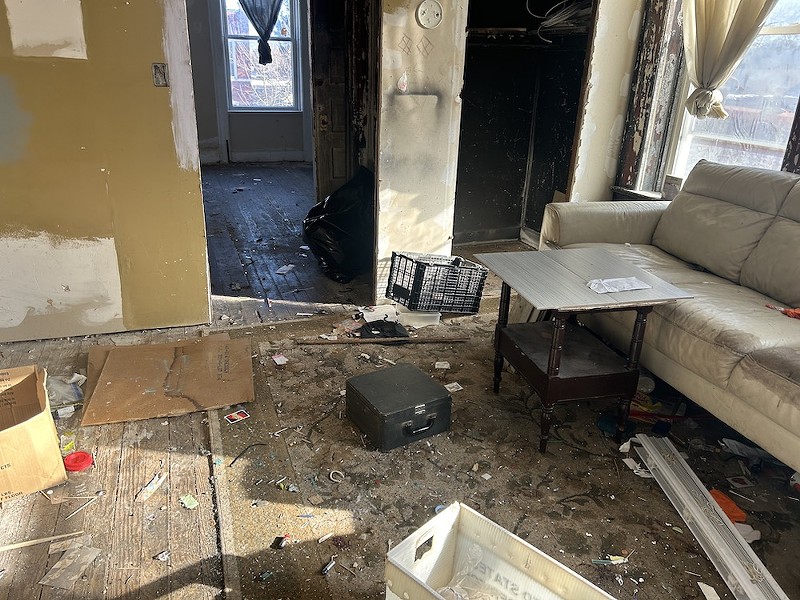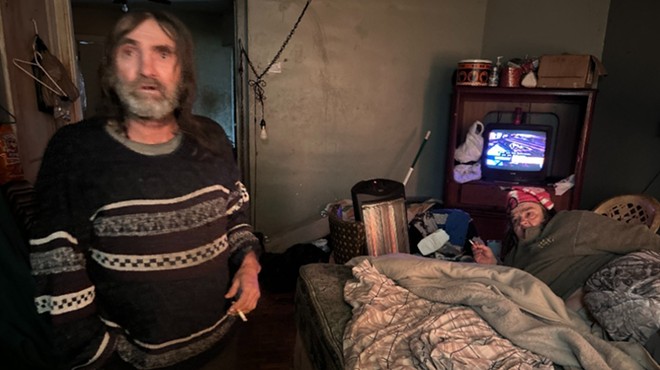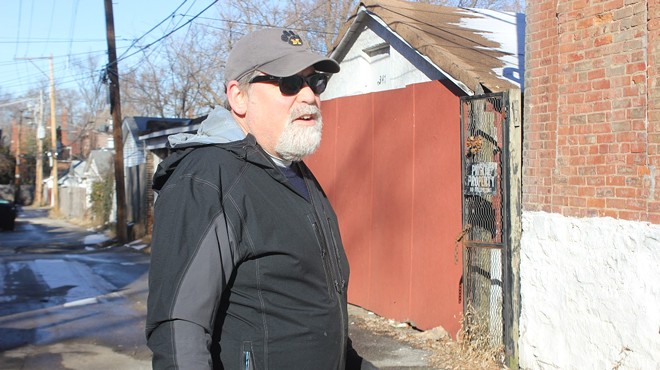On and off since 2014, Danielle Hopkins has rented from Dara Daugherty, the St. Louis slumlord who was hit last week with a lawsuit from the city accusing her of operating “illegal rooming houses” in 39 condemned houses across south city.
Most recently, Hopkins spent roughly five years at a house on South 38th Street in Dutchtown, a house that the city says has been condemned since November 2018. During that time, the city cited the house for a litany of violations and it was not legally habitable. But that didn't stop Daugherty from collecting $850 a month in rent from Hopkins.
Then there was the portion picked up by taxpayers. Hopkins says that at Daugherty's urging, she applied for money from a state-administered COVID-19 relief program and ended up getting more than $3,000, all of which Hopkins says went straight into Daugherty's pocket. Hopkins says that even though Daugherty was getting rental assistance money through her, a corresponding amount was not knocked off the rent. "You need to pay, you need to pay," Hopkins says she heard from Daugherty again and again.
"She said she'd give us some of the money but never did," Hopkins recalls.
The State Assistance For Housing Relief program, or SAFHR, provided financial aid for rent and utilities to tenants hurt financially by the pandemic. The Missouri Housing Development Commission, which oversaw the federally funded SAFHR, estimates the program prevented the evictions of at least 86,000 Missourians (although, as the River City Journalism Fund has reported, many landlords who benefited later led the area in eviction filings).
In most cases, SAFHR funds to help tenants went directly to landlords on the tenants’ behalf. That apparently includes Hopkins, who shared with the RFT emails between her and the Missouri Housing Development Commission which give credence to her claims.
In another instance uncovered by the RFT, a south city woman with a long history of mental illness — who asked that her name not be used out of fear of retaliation — received help from Daugherty in 2021 to fill out an application for a year’s worth of rental assistance, or a total of $10,800.
The application was granted in full, even though the woman’s house was condemned and considered uninhabitable, according to records from both the city and the woman’s caseworker with Places For People, a non-profit agency that helps people with mental health issues find treatment and housing.
On April 4, 2023, a Places for People caseworker wrote that the woman’s address “is considered a place not meant for habitation. This is due to severe structural issues, mold and rodents.”
The caseworker ended her letter by stating that she had partnered with the client “numerous times throughout the past year to address these issues, with no response from her landlord.”
The tenant says others who rent from Daugherty have told her they also received SAFHR payments, even though their properties are also condemned.
Daugherty “was getting it on everybody,” the woman says of the SAFHR funding.
Housing experts interviewed for this story told the RFT that it is highly unlikely that Daugherty could have obtained the SAFHR funds legally, since the housing of people in condemned properties would automatically invalidate any lease or other contract.
“I don’t think that could be kosher for the simple fact that already doing that rental agreement is an illegal contract,” says Glenn Burleigh, who, until his recent exit, was a longtime counselor for Metropolitan St. Louis Equal Housing and Opportunity Council, or EHOC.
“Since it’s already an illegal contract, since nobody should’ve been able to move into that place in the first place,” Burleigh adds, “ you shouldn’t be able to request any money on it.”
Brian Vollenweider, a spokesman for the Missouri Housing Development Commission, which oversees SAFHR funding, did not return calls seeking comment Monday.
Keith Mack, a real estate investor who is one of Daugherty’s co-defendants in the city lawsuit, acknowledged fathering three young daughters with Daugherty, but says their romantic relationship ended five years ago and they no longer do business together.
“I’m being railroaded by the city,” Mack says.
Mack acknowledges that he helped some of his tenants obtain SAFHR funding, but he declines to say how much. He denies that any of those tenants live in condemned buildings.
“I’ve never scammed anybody. I never will scam anybody,” Mack says. “I was raised Beaver Cleaver.”
Mack acknowledges that some of the properties he and Daugherty rented out did not have valid occupancy permits.
“But the properties had running water, electricity,” he says. “She’s got a shit ton of electricity, gas bills and everything. Who cares if the utilities are in her name? She paid the utilities. Most of the people couldn’t even get utilities in their name because they weren’t credit-worthy enough.”
Mack directs much of the blame to the city itself.
“The city allowed the properties to go the way they were,” Mack says. “The city allowed the electric to be on at the properties, so if they were so uninhabitable, why didn’t the people go somewhere else?”
Mack also praises Daugherty’s willingness to take in tenants other landlords wouldn’t touch, such as registered sex offenders.
“I don’t like sex offenders,” he says. “But you know what? She had a heart and rented to the sex offenders because the state asked her to. She’s got a soft heart. She’s not the devil that everybody is portraying her to be.”
Aloysius Reiter says that he rented from Daugherty from between 2016 and 2019, before the pandemic and pandemic-relief entered the public lexicon. But Reiter's experience with Daugherty, which was not good, speaks to Daugherty's M.O. when it came to renters on government assistance.
Reiter, who is legally blind, says that he received $900 a month in disability payments, a little more than half of which went to rent to Daugherty.
At one point, Reiter told Daugherty he'd gotten a job, and his landlord went off on him.
"And she seemed furious about that," Reiter recounts. "She wanted me to be beholden to my disability."
Reiter adds, "Her and that Keith are very manipulative people."
Subscribe to Riverfront Times newsletters.
Follow us: Apple News | Google News | NewsBreak | Reddit | Instagram | Facebook | Twitter | Or sign up for our RSS Feed











